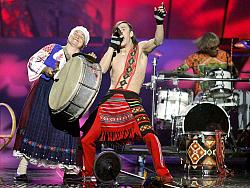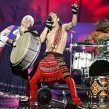
ATTEMPT AT MASS PROTEST IN KYIV DEMONSTRATES OPPOSITION WEAKNESSES
Publication: Eurasia Daily Monitor Volume: 2 Issue: 100
By:

The former Ukrainian authorities, now in opposition to President Viktor Yushchenko, are trying to attract public attention to their problems. The popular Eurovision Song Contest, held May 19 in Kyiv, provided an opportunity to play to the visiting international media. Protesting against “political persecution,” the Party of Regions (PRU) of presidential election loser Viktor Yanukovych and the Social Democratic Party-United (SDPUo) organized protests in Kyiv, while radical youths linked to them tried to storm the Sports Palace, where hundreds of journalists had gathered for Eurovision’s opening ceremony.
A crowd of some 3,000 PRU supporters picketed the parliament building in Kyiv early on May 19, while PRU and SDPUo deputies blocked the parliamentary rostrum, delaying the start of the morning session. The protesters demanded that the authorities release Donetsk regional council head Borys Kolesnykov and drop criminal charges against former Trans-Carpathian governor Ivan Rizak. Kolesnykov, who also manages the PRU’s local branch, remains in prison, awaiting a court verdict on extortion charges (see EDM, April 11). As for Rizak, who on May 13 was charged with official abuse and driving a pro-opposition university rector to suicide last year (see EDM, May 18), police on May 20 escorted him to prison, despite physical resistance offered by two SDPUo deputies. Rizak heads the Trans-Carpathian SDPUo branch.
Yanukovych appeared before television cameras near parliament on May 19. “We have decided to attract the attention of the government and of the international community to what the government is now doing to the opposition and its leaders,” Yanukovych told TV crews. “This is a warning.” Yanukovych claimed that the new government has sacked over 18,000 people “for their political convictions,” and he warned against “building a police state.” Hundreds of local bureaucrats who backed Yanukovych in the elections have indeed been fired, and President Viktor Yushchenko has promised more dismissals (see EDM, May 16).
Later in the morning, more people arrived in Kyiv on buses, mostly from the eastern regions that were Yanukovych’s stronghold during last year’s election campaign. They were predominantly young people, and the Ukrayina moloda pro-government daily reported that they had been paid to come to Kyiv. After picketing parliament, the protesters marched past the Interior Ministry, the Prosecutor-General’s Office, and Yushchenko’s administrative offices, but their ranks grew thinner along the way. In the evening, when Eurovision’s semi-finals were underway at the Sports Palace, a crowd of young people, numbering 100-500 according to different estimates, tried to break the police cordon near the contest venue. They wanted to “draw the international community’s attention to human rights violations in Ukraine,” according to their leaflets, dropped in quantities near the Sports Palace. The police pushed the protesters back outside the fence surrounding the venue, and no one was hurt. The Youth of Regions of Ukraine — PRU’s youth wing — claimed responsibility for the incident. Prosecutors launched criminal proceedings, and the organizers of the rallies near the Sports Palace may face up to four years in prison.
On May 20 the PRU and SDPUu factions in parliament announced that the opposition had no intention to spoil Eurovision and “tarnish Ukraine’s reputation.” Therefore the protests against the arrests of Kolesnykov and Rizak would temporarily stop and resume on May 31. This was tantamount to admitting defeat. The May 19 protests were too weak to achieve their real goal of attracting media attention and were largely ignored by international correspondents. The declared goal — to persuade the government to release Kolesnykov and Rizak — was not achieved either. The PRU and SDPUo factions finally allowed parliament to convene on May 19 in exchange for a promise from the parliamentary majority that the Prosecutor-General’s Office would be asked to release Kolesnykov and Rizak. Parliament passed a non-binding resolution asking the Prosecutor-General’s Office to release them, but the Office refused.
The May 19 events also demonstrated that the elites defeated by Yushchenko in the elections five months ago are still in complete disarray. Only the marginal Brotherhood organization of radical politician Dmytro Korchynsky took an active part in the protests along with the PRU and the SDPUo. The organizers failed to demonstrate a united front. While PRU leader Yanukovych came to parliament, SDPUo leader Viktor Medvedchuk — former President Leonid Kuchma’s chief aide — was nowhere to be seen. On the following day, the opposition weekly 2000 published a very long, but toothless interview with Medvedchuk, in which Yanukovych was hardly mentioned. Medvedchuk did not say anything specific about his plans for the 2006 parliamentary elections, either. In an interview with the BBC one week ago, Yanukovych said he hopes to establish a bloc with the SDPUo for the elections, but he had to admit that he had only a few short meetings with Medvedchuk after the presidential polls.
(BBC Ukrainian Service, May 12; Interfax-Ukraine, May 19, 20; Channel 5 TV, May 19; Ukrayina moloda, 2000, ICTV, May 20)




